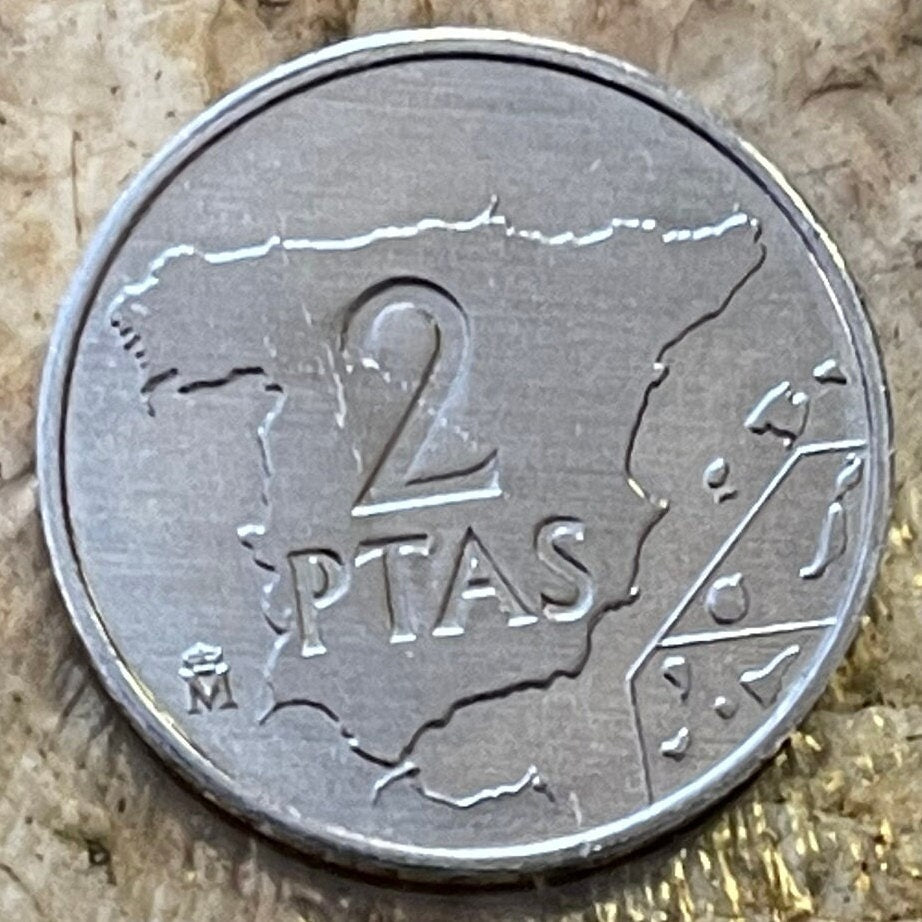elemintalshop
Spain Map & King Juan Carlos 2 Pesetas Authentic Coin Money for Jewelry and Craft Making (Balearic Islands) (Canary Islands)
Spain Map & King Juan Carlos 2 Pesetas Authentic Coin Money for Jewelry and Craft Making (Balearic Islands) (Canary Islands)
Couldn't load pickup availability
Spain Map & King Juan Carlos 2 Pesetas Authentic Coin Money for Jewelry and Craft Making
Reverse: Map of Spain, with value of coin superimposed.
Lettering: 2 PTAS M
Translation: 2 Pesetas Madrid
Obverse: Portrait in left profile of Juan Carlos I
Lettering: JUAN CARLOS I REY DE ESPAÑA
Translation: Juan Carlos I King of Spain
Features
Issuer Spain
King Juan Carlos I (1975-2014)
Type Standard circulation coin
Years 1982-1984
Value 2 Pesetas (2 ESP)
Currency Peseta (1868-2001)
Composition Aluminium (Al960 Mg35 Mn5)
Weight 2 g
Diameter 24 mm
Thickness 1.6 mm
Shape Round
Technique Milled
Orientation Coin alignment ↑↓
Demonetized 1 January 1997
Number N# 4050
References KM# 822, Schön# 52
Wikipedia:
Spain (Spanish: España, [esˈpaɲa], also Kingdom of Spain officially (Spanish: Reino de España), is a country in southwestern Europe with parts of territory in the Atlantic Ocean and across the Mediterranean Sea. The largest part of Spain is situated on the Iberian Peninsula; its territory also includes the Canary Islands in the Atlantic Ocean, the Balearic Islands in the Mediterranean Sea, the autonomous cities of Ceuta and Melilla, and several minor overseas territories also scattered along the Moroccan coast of the Alboran Sea. The country's mainland is bordered to the south by Gibraltar, to the south and east by the Mediterranean Sea; to the north by France, Andorra and the Bay of Biscay; and to the west by Portugal and the Atlantic Ocean.
With an area of 505,990 km2 (195,360 sq mi), Spain is the largest country in Southern Europe, the second-largest country in Western Europe and the European Union, and the fourth-largest country by area on the European continent. With a population exceeding 47.4 million, Spain is the sixth-most populous country in Europe, and the fourth-most populous country in the European Union. Spain's capital and largest city is Madrid; other major urban areas include Barcelona, Valencia, Seville, Zaragoza, Málaga, Murcia, Palma de Mallorca, Las Palmas de Gran Canaria and Bilbao.
*******
WIkipedia:
Juan Carlos I, Juan Carlos Alfonso Víctor María de Borbón y Borbón-Dos Sicilias, born 5 January 1938) is a member of the Spanish royal family who reigned as King of Spain from 22 November 1975 until his abdication on 19 June 2014. In Spain, since his abdication, Juan Carlos has usually been referred to as the Rey Emérito ("King Emeritus").
Juan Carlos is the grandson of Alfonso XIII, the last king of Spain before the abolition of the monarchy in 1931 and the subsequent declaration of the Second Spanish Republic. Juan Carlos was born in Rome during his family's exile. Francisco Franco took over the government of Spain after his victory in the Spanish Civil War in 1939, yet in 1947 Spain's status as a monarchy was affirmed and a law was passed allowing Franco to choose his successor. Juan Carlos's father, Juan, was the third son of King Alfonso XIII, who assumed his claims to the throne since the king's death in February 1941. However, Juan was seen by Franco to be too liberal and in 1969 was bypassed in favour of Juan Carlos as Franco's successor as head of state.
Juan Carlos spent his early years in Italy and came to Spain in 1947 to continue his studies. After completing his secondary education in 1955, he began his military training and entered the General Military Academy at Zaragoza. Later, he attended the Naval Military School and the General Academy of the Air, and finished his tertiary education at the University of Madrid. In 1962, Juan Carlos married Princess Sophia of Greece and Denmark in Athens. The couple had two daughters and a son together: Elena, Cristina, and Felipe. Due to Franco's declining health, Juan Carlos first began periodically acting as Spain's head of state in the summer of 1974. Franco died in November the following year and Juan Carlos became king on 22 November 1975, two days after Franco's death, the first reigning monarch since 1931, although his exiled father did not formally renounce his claims to the throne in favor of his son until 1977.
Juan Carlos was expected to continue Franco's legacy. However, Juan Carlos introduced reforms to dismantle the Francoist regime and to begin the Spanish transition to democracy soon after his accession. This led to the approval of the Spanish Constitution of 1978 in a referendum which re-established a constitutional monarchy. In 1981, Juan Carlos played a major role in preventing a coup that attempted to revert Spain to Francoist government in the King's name. In 2008, he was considered the most popular leader in all Ibero-America. Hailed for his role in Spain's transition to democracy, the King and the monarchy's reputation began to suffer after controversies surrounding his family arose, exacerbated by the public controversy centering on an elephant-hunting trip he undertook during a time of financial crisis in Spain.
In June 2014, Juan Carlos, citing personal reasons, abdicated in favour of his son, who acceded to the throne as Felipe VI.
Share



















